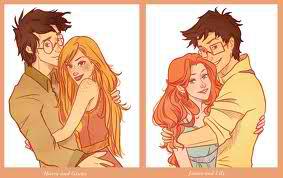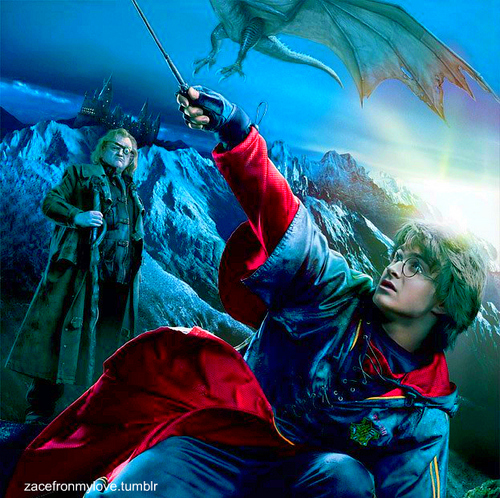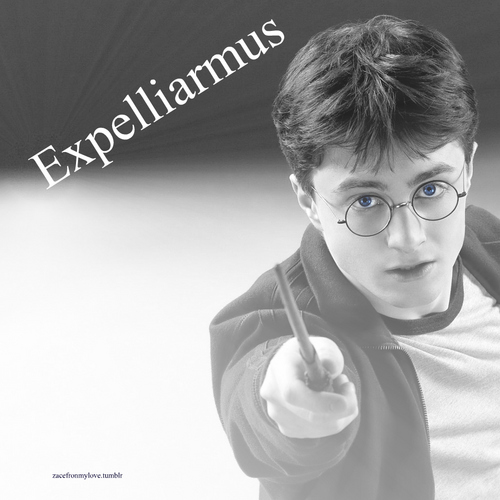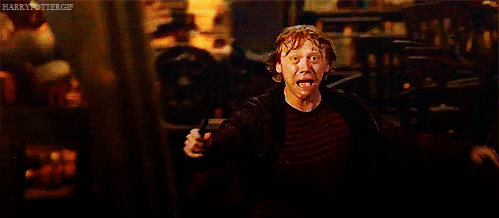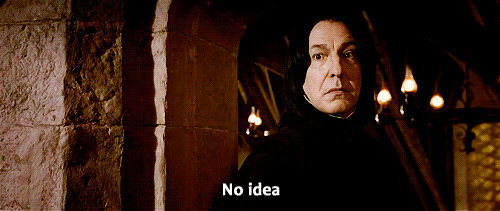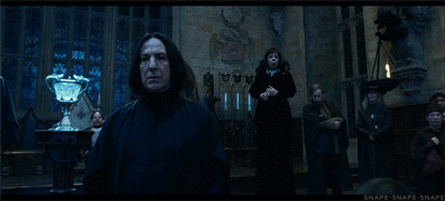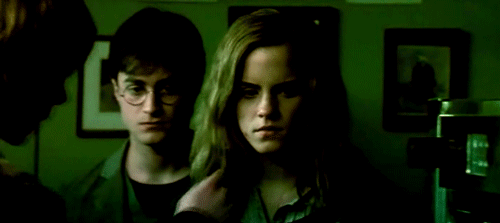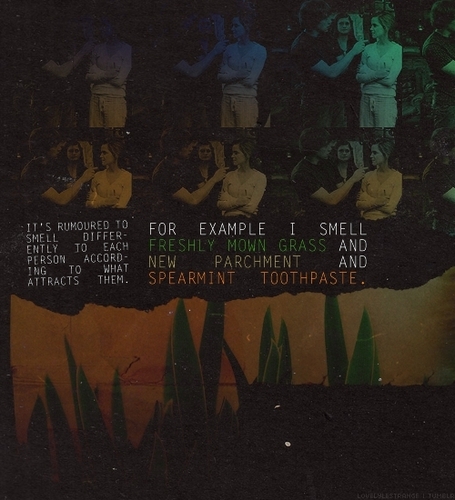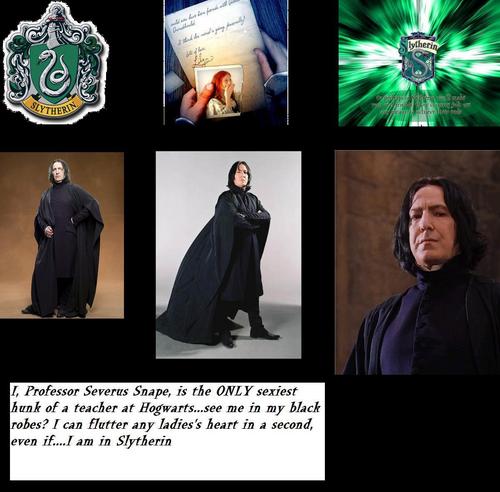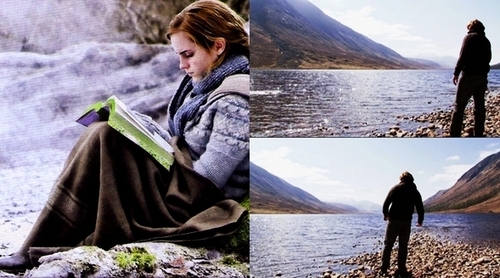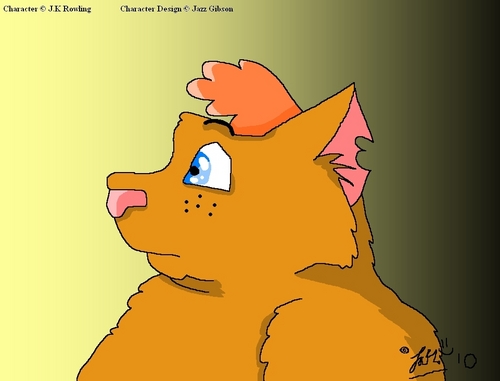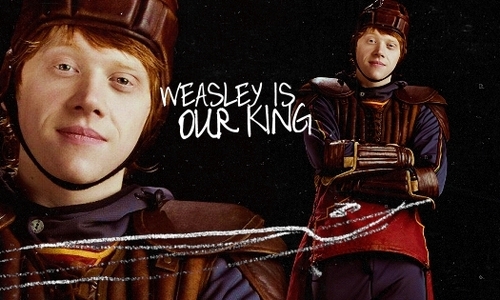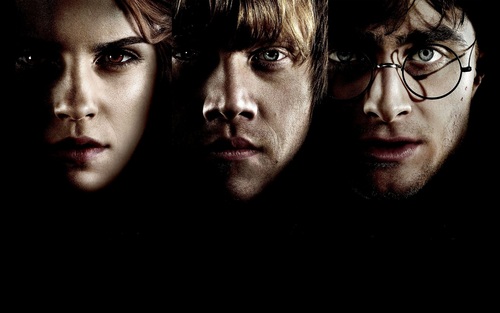I love the fact Barty Junior was a Death Eater. That's what I fell in love with, in him; a judge's son being a Death Eater - that sweet, delicious irony!! And I'm also very fond of fictional, troubled father-son relationships.
Most people think Crouch Jr. is more like Voldemort than anyone else of the Death Eaters because they both ended up killing their own father with glee, while they were bitter to them. So far I totally agree.
Before talking to Dumbledore under the influence of veritaserum, the book describes ”Moody” looking "completely insane" when he said, that both he and Voldemort had very disappointing fathers… “very disappointing, indeed….”, he added – most certainly thinking of his own father there, and states that they both had “suffered the indignity of being named after those fathers”. And how they both had the pleasure... "the very great pleasure"... to kill their own father. 95% of people seem to have – perhaps because of that connection between Voldemort and Junior - drawn a conclusion that Junior’s relationship with his father was always somehow especially distant/horrible/bittering or in some other way similar to Voldemort’s experience, and that Junior truly and genuinely wanted to kill his father and was always a fanatic DE. In that I must disagree.
Because it seems to me like there are a few – in my opinion essential – points that make a big difference between his and Voldemort's daddy issues, and so may affect the Voldemort-Junior relationship too, in the deepest. At least to begin with - whatever the end.
My conclusions were and are:
1.) Junior did not have that bad relationship with his father before the trial's events. By all means, they might have even been close.
2.) He never really wanted to kill his father, in the deepest.
3.) During the first war - he was a devoted-to-a-degree but not a remarkably fanatic Death Eater.
Yes, Junior tells Harry, it was a "great pleasure" to kill his own father. But he was descrubed to look "completely insane" as in not being himself, when he said it. And then, when he – under the influence of veritaserum - tells it to Dumbledore (that he’d killed his own father), the book does not describe any tone or expression, so we don’t know how he actually felt. You might think it’d show in that situation if he’d really felt a genuine, great pleasure of it, because such an emotion clearly showed, when he recalled the moment, when Voldemort had cast the Imperius Curse on the father – so the veritaserum did not stop him from expressing his true feelings about what he was speaking – especially when it came to his father.
But that's not even nearly all. As I read the book, I personally also analyzed such details as follows:
A.) Junior, seeming to be in utter distress, panicked, begged and pleaded his father to look at him as his own son, who he was and so not judge him so harshly. If Junior had already then been utterly bitter or disappointed in his father, I don’t think he’d chosen to do that. Of course, many interpret Junior’s behavior as a cunning and cold manipulation attempt. I only saw it as manipulation combined to a genuine distress and faith in his father. Because:
B.) Regardless of having faith in Voldemort still being alive - (he did, because he obsessed about finding Voldemort after getting out of Azkaban) – Junior was dying within a year in Azkaban, after his father had denied his very relationship with him and sent him to hell to die. THAT mostly caused Junior to think of his father as a very disappointing one and it to be a indignity to be named after him - especially, if he had been close with his father like they were in my interpretation. I mean, of course Junior had experienced disappointments throughout his childhood and grown bitter in some terms, but not so huge that he’d lost faith and love - and so only that trial threw him into the “very disappointing indeed” and "indignity" state of mind. But obviously even after that, his bitterness wasn’t right away too strong and driving. As Junior did not want to wait for Voldemort and he didn’t harbour revenge to his father, but he wanted to die. His emotion in the trial very likely was genuine and not an act.
Also, anyone who is fanatic about Voldemort, is not in their right mind, and would gladly go to Azkaban, care about Voldemort's possible return and wait for him. All this is what the Lestranges did. And what Barty Jr. did NOT do. He could not have been a fanatic Deathe Eater during the first war.
C.) His father saved his life and thus Junior was in life debt. It’s not essential why Junior believed his father had saved his life. (As in for the mother, who Junior said he believed the father loved as he had never loved him; in other words that the father loved the mother MORE or in a different level, than the man ever had loved him. Not that he thought the father had never love him at all. Which leads to that, even in that insane and bitter state of mind, Junior still remembered that his father had loved him. Something like that can’t possibly not affect feelings, especially when combined to a life debt. Voldemort on his half – knew nothing of love or at least didn’t understand it.
D.) Junior also told that when Voldemort sent him news about the father’s escape, Voldemort "told me to stop my father at all costs" - and on the previous page Junior had said, that his greatest ambition was, for one, to prove himself to Voldemort. And what would be more affective than killing his own father like uncle Voldy had killed his own?
Being very disappointed in his father – (after the trial this would’ve increased majorly especially if they were close with each other) + being mentally ill & "completely insane" looking + over-whelming desire to prove himself to Voldemort = a "great pleasure" of killing his own father. Not necessarely any true, genuine will or being pushed into it with a distant/horrible father-relationship from the beginning, unlike Voldemort’s case was. And for all that I might question was the pleasure that deeply genuine either after all. Also as it didn’t show again in any way in the second time he spoke of it in a non-“completely-insane” state of mind.
You may remember that Voldemort also asked Junior in GoF "Are you ready to risk everything for me?" (Junior told he’d asked that.) Why would Voldemort have asked that, if Junior had always been ready and willing, and thus especially bitter to his father and worshipping / fanatic to his master?
Nobody seems to care that Jo PUT WEIGHT in her writing, on how Junior may NOT have been invovlved in the Longbottom torture while NOT confirming at ANY point that he was guilty of it. Why shouldn't that be significant?
Don't you think she likely meant something by the way she put that part of Junior's story? If she really meant him to have part in the Longbottom torture so simply and cruelly - I'd suppose she'd weighted on such image, instead of the opposite. And it's not the first time in the history that even innocent people get imprisoned while evidence speak loudly enough against them.
But because Junior was a Death Eater for sure, back then, and so certainly had it in him to cast some unforgivable curses and was somewhat cruel - I personally chose the middle road; that he did take part in the torture but not entirely out of his own free will.
His emotion in the book's version of the trial, must have been genuine and not an act - because he didn't choose to wait for Voldemort or harbour revenge on his father but he wanted to DIE and even within a year, and he was dying, indeed. As in - doesn't seem like a cold-blooded torturer-murderer-Voldemort-devoted-fannatic to me.
So, I personally can not see Voldemort and Junior any more in the beginning than in the end, as true ”soul mates” – but only seemingly and even that part beginning only after Azkaban, wheres somewhere deep inside Junior’s sick mind and twisted heart, there may have been a man, to who the fact that his father had loved him some time and saved his life, still meant something. If not much because he was emotionally utterly damaged and mentally ill, but still something. Junior himself of course, twisted and sick as he was, saw everything in extreme way.
As analyzed, I think it’s likely that Junior would’ve never killed his father at least before the trial and Azkaban and the 13 years after, since he lost his will to live after his father’s words and the sentence. And in the end I believe he did it most essentially because of his sick mind and driven by his desire to prove himself to Voldemort, whereas his bitterness carried it well.
Most people think Junior really was distant with his father and utterly devoted to Voldemort as a replacement father of sorts or that it was the driving element. It's possible - I agree. But I never did and never will see it that way. I'd reckon this article clarified a lot of why in my view Junior was not looking for downright a father-figure replacement or love in Voldemort but only the acceptance/approval he had been essentially missing from his father and also wanted to get back at him in power matters and stuff related to his father's ambition. But he didn't need Voldemort to replace his father in any truly emotional way, like love and closeness - that he had from his father and it's not as if he'd found that from Voldemort anyway.
“I will be honored beyond all other Death Eaters. I will be his dearest, his closest supporter... closer than a son...”
That too works for my interpretation that Junior had been close with his daddy. If a close father does what Senior did, the son would certainly come to desire to become even closer with someone new he’d become to worship – so that the disappointment wouldn’t happen again.
The only thing that implies Senior working so much that he didn't get to know his son, is Sirius saying so and that is not a reliable source, seeing to Sirius's opinion on Senior and how he was not a family friend anyway, as far as we know. Of course Sirius may have been looking to the right direction, as in, partly right. But he certainly was in no place to tell in which way Senior's working affected the man's family relationships.
Of course, Junior's relationship with his father had to have become essentially and critically troubled at some point or else Junior wouldn't have joined Voldemort's cause. But it doesn't mean they couldn't have remained close in their hearts or that he'd been looking for a father replacement. I think they had hope all the way to the trial, in which his Dad, unintenitionally, destroyed it all. After the year in Azkaban, Junior simply didn't hear his heart anymore because it had been broken and grown back cold and twisted and later on his mind got ill. And he never forgave his father, while the power of forgiveness is the only emotion that conquers all obstacles to do the right thing. But it's not connected to love so strongly. Love, if it was true, is always there. Even if your mind got sick and you lost it - the imprint is always there.
And there is a logic reason how a close father, who knows and loves his son, might end up doing what Junior's father did in the trial. You see, I can't bring myself to dismiss the trial's events and emotional elements that would have to be extremeley shocking and affecting to any family, to any father. Junior having become a DE wasn't necessarely a complete surprise to the father - just extremely unpleasent and a nightmare to actually have happened and then if combined to (enough) undeniable evidence of the unspekable torture crime particopating, and all this publicly revealed - I can easily imagine the look in Senior's eyes growing distant as if he was looking at a stranger instead of his close son (thanks to the shock and growing fury.) And this look finally triggering the genuine fear and not-cunning but desperate manipulation attempt, in Junior, causing him to desperately deny any part of it regardless of if it was a lie (while it may have been even the truth) - so that his dad would somehow still remember what he really knew (including that he, Junior, would never take part in such a crime ((out of his own free will)).) Which ought to also mean that the trial events and emotions in itself do not tell that much about his father.
I'm not insisting that they necessarely were close. It's just a possibility. So basically all I'm trying to say with this article, is that I don't think the person Barty Crouch Jr. originally was, was too much like Voldemort. But only the utterly disappointed, hurt and sick person he became after his trial, the disowning, Azkaban and 13 years under the Imperius Curse. Which could've been far, far from the person he originally was. Junior surely was devoted to Voldemort to a degree all along, but remarkably less so during the first war than in 1994.
This article's point in a nutshell; Yes, Barty Crouch Junior is a Voldemort admirer but I think there is supposed to be much, much more to him in the first place, than that.
I hate what the film did to such a brilliant and deep character. It surely doesn't help at all to change how overlooked this character is.
link - That article is reviewing his devotion as a Death Eater, his possible part in the Longbottom torture, his childhood, his father's love for him and their relationship’s possible closeness - and some other things - always basing on what we can read from the Goblet of Fire book. In the end of the article, I also link to couple of my fanfics which I’ve written in this interpretation of mine.
Most people think Crouch Jr. is more like Voldemort than anyone else of the Death Eaters because they both ended up killing their own father with glee, while they were bitter to them. So far I totally agree.
Before talking to Dumbledore under the influence of veritaserum, the book describes ”Moody” looking "completely insane" when he said, that both he and Voldemort had very disappointing fathers… “very disappointing, indeed….”, he added – most certainly thinking of his own father there, and states that they both had “suffered the indignity of being named after those fathers”. And how they both had the pleasure... "the very great pleasure"... to kill their own father. 95% of people seem to have – perhaps because of that connection between Voldemort and Junior - drawn a conclusion that Junior’s relationship with his father was always somehow especially distant/horrible/bittering or in some other way similar to Voldemort’s experience, and that Junior truly and genuinely wanted to kill his father and was always a fanatic DE. In that I must disagree.
Because it seems to me like there are a few – in my opinion essential – points that make a big difference between his and Voldemort's daddy issues, and so may affect the Voldemort-Junior relationship too, in the deepest. At least to begin with - whatever the end.
My conclusions were and are:
1.) Junior did not have that bad relationship with his father before the trial's events. By all means, they might have even been close.
2.) He never really wanted to kill his father, in the deepest.
3.) During the first war - he was a devoted-to-a-degree but not a remarkably fanatic Death Eater.
Yes, Junior tells Harry, it was a "great pleasure" to kill his own father. But he was descrubed to look "completely insane" as in not being himself, when he said it. And then, when he – under the influence of veritaserum - tells it to Dumbledore (that he’d killed his own father), the book does not describe any tone or expression, so we don’t know how he actually felt. You might think it’d show in that situation if he’d really felt a genuine, great pleasure of it, because such an emotion clearly showed, when he recalled the moment, when Voldemort had cast the Imperius Curse on the father – so the veritaserum did not stop him from expressing his true feelings about what he was speaking – especially when it came to his father.
But that's not even nearly all. As I read the book, I personally also analyzed such details as follows:
A.) Junior, seeming to be in utter distress, panicked, begged and pleaded his father to look at him as his own son, who he was and so not judge him so harshly. If Junior had already then been utterly bitter or disappointed in his father, I don’t think he’d chosen to do that. Of course, many interpret Junior’s behavior as a cunning and cold manipulation attempt. I only saw it as manipulation combined to a genuine distress and faith in his father. Because:
B.) Regardless of having faith in Voldemort still being alive - (he did, because he obsessed about finding Voldemort after getting out of Azkaban) – Junior was dying within a year in Azkaban, after his father had denied his very relationship with him and sent him to hell to die. THAT mostly caused Junior to think of his father as a very disappointing one and it to be a indignity to be named after him - especially, if he had been close with his father like they were in my interpretation. I mean, of course Junior had experienced disappointments throughout his childhood and grown bitter in some terms, but not so huge that he’d lost faith and love - and so only that trial threw him into the “very disappointing indeed” and "indignity" state of mind. But obviously even after that, his bitterness wasn’t right away too strong and driving. As Junior did not want to wait for Voldemort and he didn’t harbour revenge to his father, but he wanted to die. His emotion in the trial very likely was genuine and not an act.
Also, anyone who is fanatic about Voldemort, is not in their right mind, and would gladly go to Azkaban, care about Voldemort's possible return and wait for him. All this is what the Lestranges did. And what Barty Jr. did NOT do. He could not have been a fanatic Deathe Eater during the first war.
C.) His father saved his life and thus Junior was in life debt. It’s not essential why Junior believed his father had saved his life. (As in for the mother, who Junior said he believed the father loved as he had never loved him; in other words that the father loved the mother MORE or in a different level, than the man ever had loved him. Not that he thought the father had never love him at all. Which leads to that, even in that insane and bitter state of mind, Junior still remembered that his father had loved him. Something like that can’t possibly not affect feelings, especially when combined to a life debt. Voldemort on his half – knew nothing of love or at least didn’t understand it.
D.) Junior also told that when Voldemort sent him news about the father’s escape, Voldemort "told me to stop my father at all costs" - and on the previous page Junior had said, that his greatest ambition was, for one, to prove himself to Voldemort. And what would be more affective than killing his own father like uncle Voldy had killed his own?
Being very disappointed in his father – (after the trial this would’ve increased majorly especially if they were close with each other) + being mentally ill & "completely insane" looking + over-whelming desire to prove himself to Voldemort = a "great pleasure" of killing his own father. Not necessarely any true, genuine will or being pushed into it with a distant/horrible father-relationship from the beginning, unlike Voldemort’s case was. And for all that I might question was the pleasure that deeply genuine either after all. Also as it didn’t show again in any way in the second time he spoke of it in a non-“completely-insane” state of mind.
You may remember that Voldemort also asked Junior in GoF "Are you ready to risk everything for me?" (Junior told he’d asked that.) Why would Voldemort have asked that, if Junior had always been ready and willing, and thus especially bitter to his father and worshipping / fanatic to his master?
Nobody seems to care that Jo PUT WEIGHT in her writing, on how Junior may NOT have been invovlved in the Longbottom torture while NOT confirming at ANY point that he was guilty of it. Why shouldn't that be significant?
Don't you think she likely meant something by the way she put that part of Junior's story? If she really meant him to have part in the Longbottom torture so simply and cruelly - I'd suppose she'd weighted on such image, instead of the opposite. And it's not the first time in the history that even innocent people get imprisoned while evidence speak loudly enough against them.
But because Junior was a Death Eater for sure, back then, and so certainly had it in him to cast some unforgivable curses and was somewhat cruel - I personally chose the middle road; that he did take part in the torture but not entirely out of his own free will.
His emotion in the book's version of the trial, must have been genuine and not an act - because he didn't choose to wait for Voldemort or harbour revenge on his father but he wanted to DIE and even within a year, and he was dying, indeed. As in - doesn't seem like a cold-blooded torturer-murderer-Voldemort-devoted-fannatic to me.
So, I personally can not see Voldemort and Junior any more in the beginning than in the end, as true ”soul mates” – but only seemingly and even that part beginning only after Azkaban, wheres somewhere deep inside Junior’s sick mind and twisted heart, there may have been a man, to who the fact that his father had loved him some time and saved his life, still meant something. If not much because he was emotionally utterly damaged and mentally ill, but still something. Junior himself of course, twisted and sick as he was, saw everything in extreme way.
As analyzed, I think it’s likely that Junior would’ve never killed his father at least before the trial and Azkaban and the 13 years after, since he lost his will to live after his father’s words and the sentence. And in the end I believe he did it most essentially because of his sick mind and driven by his desire to prove himself to Voldemort, whereas his bitterness carried it well.
Most people think Junior really was distant with his father and utterly devoted to Voldemort as a replacement father of sorts or that it was the driving element. It's possible - I agree. But I never did and never will see it that way. I'd reckon this article clarified a lot of why in my view Junior was not looking for downright a father-figure replacement or love in Voldemort but only the acceptance/approval he had been essentially missing from his father and also wanted to get back at him in power matters and stuff related to his father's ambition. But he didn't need Voldemort to replace his father in any truly emotional way, like love and closeness - that he had from his father and it's not as if he'd found that from Voldemort anyway.
“I will be honored beyond all other Death Eaters. I will be his dearest, his closest supporter... closer than a son...”
That too works for my interpretation that Junior had been close with his daddy. If a close father does what Senior did, the son would certainly come to desire to become even closer with someone new he’d become to worship – so that the disappointment wouldn’t happen again.
The only thing that implies Senior working so much that he didn't get to know his son, is Sirius saying so and that is not a reliable source, seeing to Sirius's opinion on Senior and how he was not a family friend anyway, as far as we know. Of course Sirius may have been looking to the right direction, as in, partly right. But he certainly was in no place to tell in which way Senior's working affected the man's family relationships.
Of course, Junior's relationship with his father had to have become essentially and critically troubled at some point or else Junior wouldn't have joined Voldemort's cause. But it doesn't mean they couldn't have remained close in their hearts or that he'd been looking for a father replacement. I think they had hope all the way to the trial, in which his Dad, unintenitionally, destroyed it all. After the year in Azkaban, Junior simply didn't hear his heart anymore because it had been broken and grown back cold and twisted and later on his mind got ill. And he never forgave his father, while the power of forgiveness is the only emotion that conquers all obstacles to do the right thing. But it's not connected to love so strongly. Love, if it was true, is always there. Even if your mind got sick and you lost it - the imprint is always there.
And there is a logic reason how a close father, who knows and loves his son, might end up doing what Junior's father did in the trial. You see, I can't bring myself to dismiss the trial's events and emotional elements that would have to be extremeley shocking and affecting to any family, to any father. Junior having become a DE wasn't necessarely a complete surprise to the father - just extremely unpleasent and a nightmare to actually have happened and then if combined to (enough) undeniable evidence of the unspekable torture crime particopating, and all this publicly revealed - I can easily imagine the look in Senior's eyes growing distant as if he was looking at a stranger instead of his close son (thanks to the shock and growing fury.) And this look finally triggering the genuine fear and not-cunning but desperate manipulation attempt, in Junior, causing him to desperately deny any part of it regardless of if it was a lie (while it may have been even the truth) - so that his dad would somehow still remember what he really knew (including that he, Junior, would never take part in such a crime ((out of his own free will)).) Which ought to also mean that the trial events and emotions in itself do not tell that much about his father.
I'm not insisting that they necessarely were close. It's just a possibility. So basically all I'm trying to say with this article, is that I don't think the person Barty Crouch Jr. originally was, was too much like Voldemort. But only the utterly disappointed, hurt and sick person he became after his trial, the disowning, Azkaban and 13 years under the Imperius Curse. Which could've been far, far from the person he originally was. Junior surely was devoted to Voldemort to a degree all along, but remarkably less so during the first war than in 1994.
This article's point in a nutshell; Yes, Barty Crouch Junior is a Voldemort admirer but I think there is supposed to be much, much more to him in the first place, than that.
I hate what the film did to such a brilliant and deep character. It surely doesn't help at all to change how overlooked this character is.
link - That article is reviewing his devotion as a Death Eater, his possible part in the Longbottom torture, his childhood, his father's love for him and their relationship’s possible closeness - and some other things - always basing on what we can read from the Goblet of Fire book. In the end of the article, I also link to couple of my fanfics which I’ve written in this interpretation of mine.


